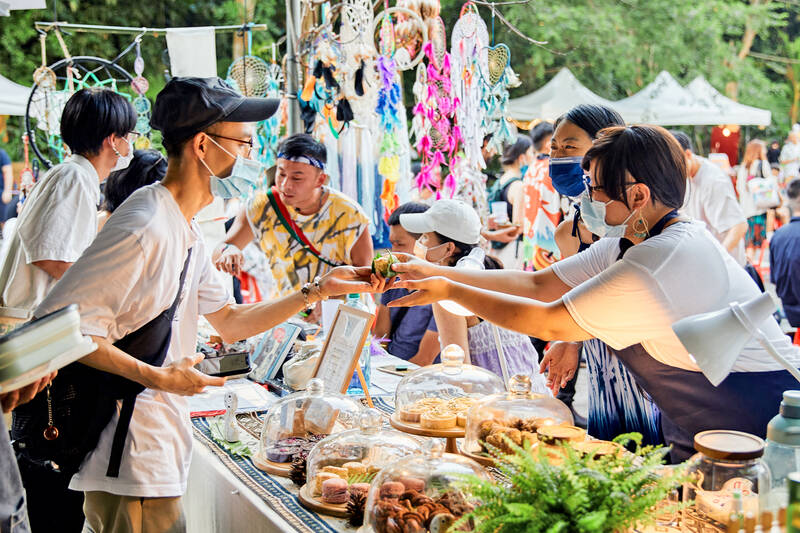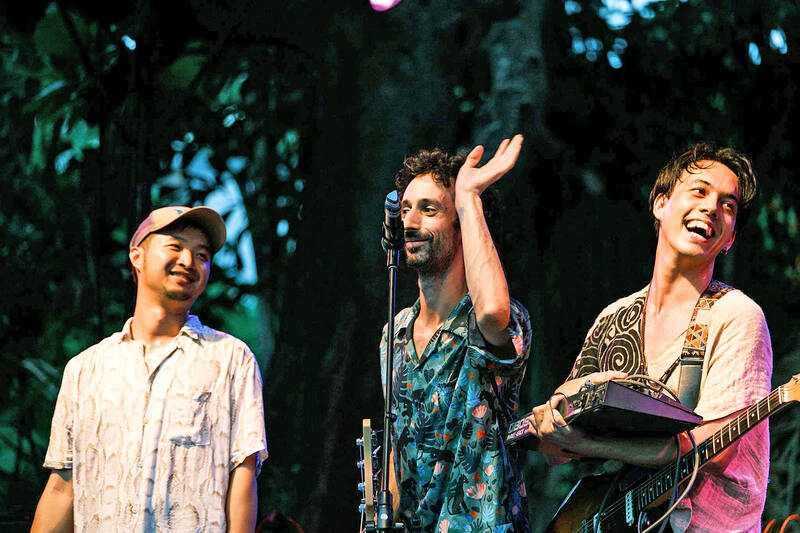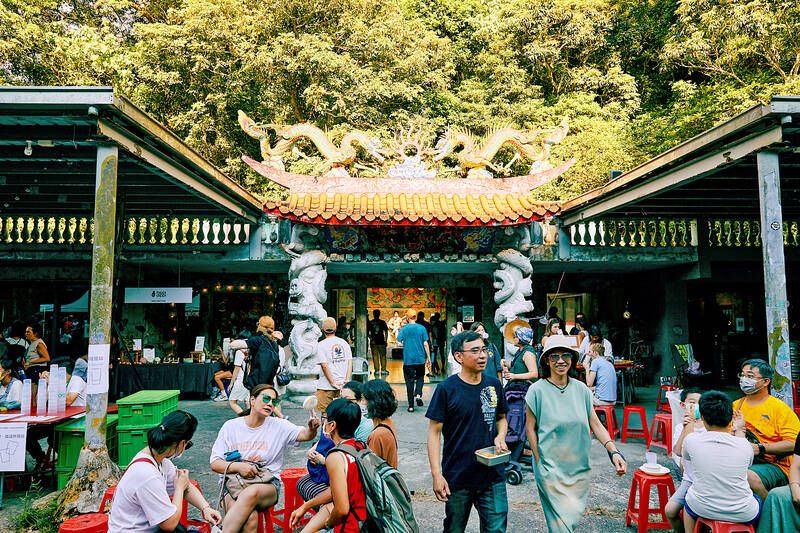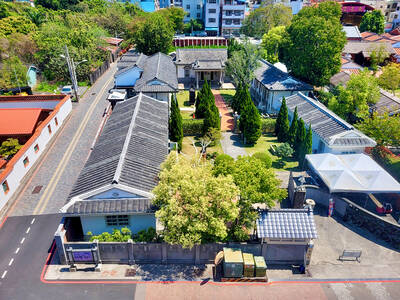Lillygol Sedaghat is bringing both her experience with Taiwan’s circular economy and breakdancing scene to this year’s Taipei Veggie Fest (台北素食生活節).
After exploring Taiwan’s waste management system, plastics recycling program and circular economy initiatives in 2017 and 2018, the National Geographic digital storyteller returned last year to further delve into the nation’s progress in repurposing waste material and sustainability.
Taking place on Saturday on Earth Day, the festival features vegan/vegetarian food, eco-friendly vendors, more than 100 musicians playing on three stages, lectures, art and yoga. Organizer Sean Scanlan says that after proving that a meat-free event was viable, the focus now is on reducing waste.

Photo courtesy of Taipei Veggie Fest
“Many say ‘Music is Life,’ but there’s actually more to ‘life’ such as our impact on the Earth, what we consume and what we throw away,” he says.
As usual, single-use tableware is not allowed so you’ll want to bring your own containers and utensils. There will be rental cups on site. Sedaghat and her partner Cory Howell are bolstering the theme by inviting local circular-economy designers they’ve met to participate in the event. For example, the stage design will be 3D printed with materials developed by National Cheng Kung University using reservoir silt and other waste.
The festival is also partnering with meat substitute companies such as OmniFoods and Lypid, which makes PhytoFat, an oil encapsulation technology that makes plant-based meat substitutes tastier.

Photo courtesy of Taipei Veggie Fest
In addition, both Sedaghat and Howell are experienced breakdancers, and they’re adding a hip-hop vibe to the Veggie Fest this year by featuring dance teacher and DJ Lin Chang-hao (林昌豪) as well as other dancers from the underground scene.
VISUALIZING CIRCULARITY

Photo courtesy of Taipei Veggie Fest
Growing up in San Diego, Sedaghat was a huge fan of Taiwanese milk tea. But it was only after she graduated college that she started wondering where the plastic waste went and how her habit impacted the environment. Eventually, this notion culminated in her arriving in Taiwan on a Fullbright-National Geographic Award grant.
Sedaghat says that while Taiwan has done an excellent job with the circular economy on the industry and policy levels, there’s still a huge disconnect when it comes to people integrating it to their everyday lives. In fact, a lot of locals she spoke to were not aware of the progress that was being made. So far, much of the effort toward the public is through the consumer lens — such as bringing their own shopping bags and cups — but that has its limits.
“If you really want to transform society, you need to have a vision that people can see themselves contributing to,” she says. “The notion of how we embrace our relationship to the planet isn’t something we talk about a lot. It’s such an abstract thing; so how can we produce it through music, food, community and activities?”

Photo courtesy of Taipei Veggie Fest
Visualizing circularity and the relationship between the environment and culture has been Sedaghat’s goal as a National Geographic storyteller for the past seven years. For this project, she hopes to highlight various ventures in Taiwan, such as a diaper company that has found a way to reuse 99 percent of diaper waste, factories that capture emitted steam and repurpose it and an academic who has been tirelessly promoting a reservoir silt-based material as a sustainable means of solving wall mold.
“Let me show you through photos, videos, multimedia and infographics how this works, how we can take it to the next step … and the people trying to change things.”
Sedaghat has noticed significant changes since her last stint in Taiwan. Nobody wanted recycled diapers five years ago, for example, but as they refined the technology and countries began setting sustainability goals that were coded into law, the market demand changed too.
“Before, the market was all price-based; it was cheaper to make something from a resource rather than recycling. Now people want that material because it has a story,” she says.
As many Taiwanese manufacturers produce for global brands, they’ve responded to this shift by taking the initiative to adapt and explore ways to achieve that within their processes.
“Giving a face to those people is important because we often give voices to brands, but the hidden supply chain is important too,” she says.

In the March 9 edition of the Taipei Times a piece by Ninon Godefroy ran with the headine “The quiet, gentle rhythm of Taiwan.” It started with the line “Taiwan is a small, humble place. There is no Eiffel Tower, no pyramids — no singular attraction that draws the world’s attention.” I laughed out loud at that. This was out of no disrespect for the author or the piece, which made some interesting analogies and good points about how both Din Tai Fung’s and Taiwan Semiconductor Manufacturing Co’s (TSMC, 台積電) meticulous attention to detail and quality are not quite up to

Chinese Nationalist Party (KMT) Chairman Eric Chu (朱立倫) hatched a bold plan to charge forward and seize the initiative when he held a protest in front of the Taipei City Prosecutors’ Office. Though risky, because illegal, its success would help tackle at least six problems facing both himself and the KMT. What he did not see coming was Taipei Mayor Chiang Wan-an (將萬安) tripping him up out of the gate. In spite of Chu being the most consequential and successful KMT chairman since the early 2010s — arguably saving the party from financial ruin and restoring its electoral viability —

It is one of the more remarkable facts of Taiwan history that it was never occupied or claimed by any of the numerous kingdoms of southern China — Han or otherwise — that lay just across the water from it. None of their brilliant ministers ever discovered that Taiwan was a “core interest” of the state whose annexation was “inevitable.” As Paul Kua notes in an excellent monograph laying out how the Portuguese gave Taiwan the name “Formosa,” the first Europeans to express an interest in occupying Taiwan were the Spanish. Tonio Andrade in his seminal work, How Taiwan Became Chinese,

Toward the outside edge of Taichung City, in Wufeng District (霧峰去), sits a sprawling collection of single-story buildings with tiled roofs belonging to the Wufeng Lin (霧峰林家) family, who rose to prominence through success in military, commercial, and artistic endeavors in the 19th century. Most of these buildings have brick walls and tiled roofs in the traditional reddish-brown color, but in the middle is one incongruous property with bright white walls and a black tiled roof: Yipu Garden (頤圃). Purists may scoff at the Japanese-style exterior and its radical departure from the Fujianese architectural style of the surrounding buildings. However, the property